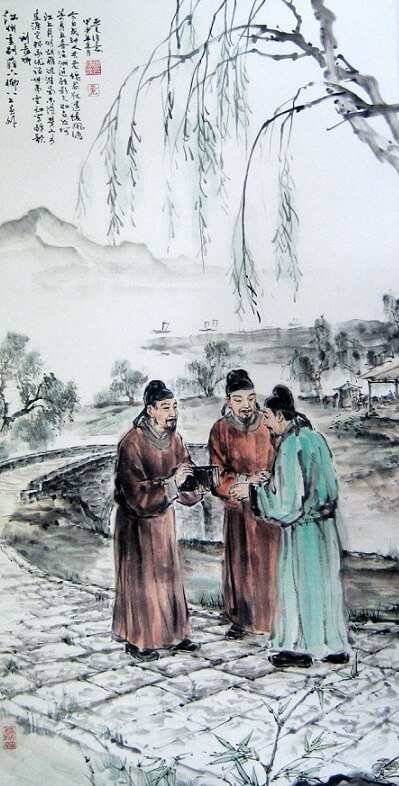On Leaving Guijiang Again to Xue and Liu
- Poetry of Liu Changqing
《江州重别薛六柳八二员外》

English Translation
Dare I, at my age, accept my summons,
Knowing of the world's ways only wine and song?....
Over the moon-edged river come wildgeese from the Tartars;
And the thinner the leaves along the Huai, the wider the southern mountains....
I ought to be glad to take my old bones back to the capital,
But what am I good for in that world, with my few white hairs?....
As bent and decrepit as you are, I am ashamed to thank you,
When you caution me that I may encounter thunderbolts.
Seven-character-regular-verse
中文原文( Chinese )
生涯岂料承优诏,世事空知学醉歌。
江上月明胡雁过,淮南木落楚山多。
寄身且喜沧洲近,顾影无如白发何。
今日龙钟人共老,愧君犹遣慎风波。
- Why Chinese poems is so special?
- The most distinctive features of Chinese poetry are: concision- many poems are only four lines, and few are much longer than eight; ambiguity- number, tense and parts of speech are often undetermined, creating particularly rich interpretative possibilities; and structure- most poems follow quite strict formal patterns which have beauty in themselves as well as highlighting meaningful contrasts.
- How to read a Chinese poem?
- Like an English poem, but more so. Everything is there for a reason, so try to find that reason. Think about all the possible connotations, and be aware of the different possibilities of number and tense. Look for contrasts: within lines, between the lines of each couplet and between successive couplets. Above all, don't worry about what the poet meant- find your meaning.
Famous Chinese Poems
- Seven Poems on Kaiyuan Era: Dancing Horses
- Midnight Song of the Four Seasons: Summer
- In Reply to Pimei’s Poem Written During Illness
- Ten Odes on Tea Utensils: Tea Vale White Lotus
- Spring Thoughts II
- The Arcane Celadon of Yue Kiln
- Lodging by Riverside Tower
- Along the River for Flowers Alone I
- The Cottage by the Stream
- The Lotus-Gathering Song
You May Also Like